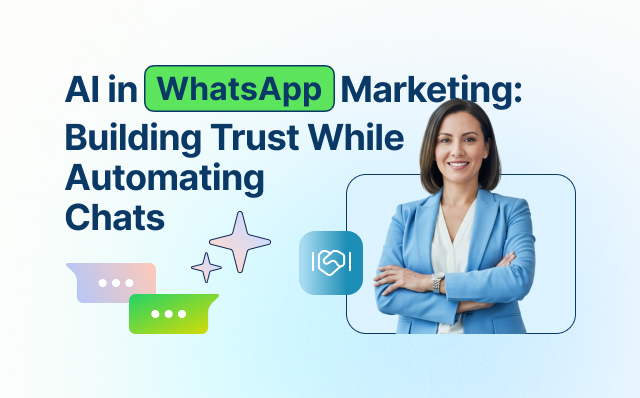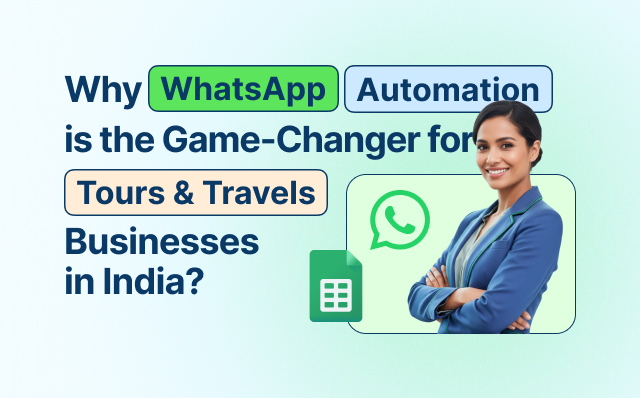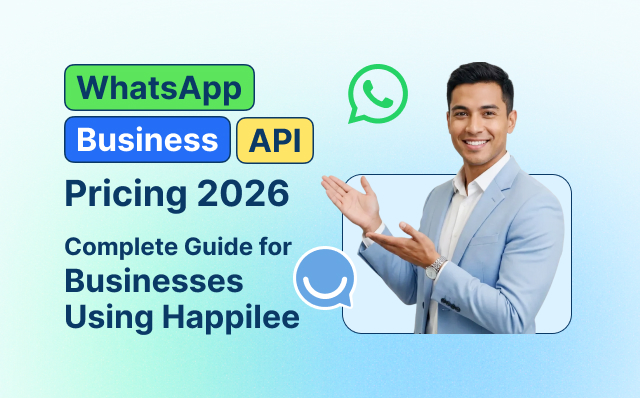With digital conversations becoming the backbone of customer engagement, AI in WhatsApp Marketing has emerged as a game-changer for businesses looking to engage customers, build trust, and scale communication without compromising on personalization. With over 2.7 billion active users, WhatsApp is the most widely used messaging platform globally. When coupled with artificial intelligence, businesses can not only automate conversations but also establish meaningful connections with customers that lead to higher trust, loyalty, and revenue growth.
At Happilee, we specialize in designing AI-driven WhatsApp solutions that empower small and medium businesses to connect with their customers in smarter, faster, and more authentic ways. Let’s dive deep into how AI is shaping WhatsApp marketing and how companies can leverage it to balance automation with human-like trust.
Why AI in WhatsApp Marketing Matters Today
The modern consumer demands instant responses, personalized interactions, and seamless support. Traditional marketing channels like email and SMS are losing relevance due to low open and engagement rates. WhatsApp, with its 98% open rate, offers unmatched immediacy.
When businesses use AI-powered WhatsApp chatbots, they can:
- Automate repetitive queries such as FAQs, order tracking, or appointment booking.
- Deliver personalized experiences using customer data and past interaction history.
- Scale customer engagement without overburdening human agents.
- Build trust through consistency, availability, and quick issue resolution.
According to HubSpot, AI-driven messaging boosts conversion rates and reduces response time significantly, making it a critical component of modern marketing strategies.
Balancing Automation and Trust
The biggest challenge in WhatsApp marketing is ensuring that automation doesn’t feel robotic or impersonal. Customers today value authenticity and transparency. An overly automated chatbot may resolve queries faster but risks alienating users if it lacks empathy.
Here’s how businesses can build trust while automating chats:
- Human-like AI Conversations – Use natural language processing (NLP) to ensure chatbot responses mimic real human dialogue.
- Seamless Agent Handover – When queries are complex, AI should smartly transfer the conversation to a human agent.
- Personalized Messaging – Address customers by name, recommend products based on past interactions, and remember preferences.
- Transparency in AI Use – Inform users they are interacting with a chatbot, while ensuring the bot provides value-driven responses.
- Data Security & Privacy – Ensure customer data is protected, which strengthens trust and compliance with regulations like GDPR. Learn more about GDPR compliance and its importance in digital marketing.
Top 12 Ways to Use AI in WhatsApp Marketing
AI in WhatsApp Marketing goes beyond simple automation. It’s about crafting smarter, personalized, and scalable engagement strategies. Below are twelve proven ways businesses can harness AI for success:
1. Automating Customer Support
AI chatbots provide 24/7 support, handling FAQs, troubleshooting, and inquiries instantly without human intervention. Explore Happilee’s Chatbot Builder to design intelligent bots without coding.
2. Lead Generation & Qualification
Through interactive conversations, AI collects user information, qualifies leads, and routes high-potential prospects to sales teams using tools like Meta Leads CRM
3. Personalized Product Recommendations
Machine learning allows AI to analyze behavior, suggesting relevant products via WhatsApp Commerce and improving cross-selling and upselling opportunities.
4. Cart Abandonment Recovery
AI can send personalized reminders to users who abandoned their cart, offering incentives like discounts to recover lost sales.
5. Automated Order Updates
Keep customers informed by automating updates on order confirmations, shipping, and delivery—building trust through transparency.
6. Payment & Transaction Assistance
Integrated AI systems can guide users through in-chat payment processes, reducing friction in the buying journey.
7. Customer Feedback Collection
AI-powered surveys can request feedback post-purchase, helping businesses gather insights while showing customers their opinion is valued.
8. Loyalty & Rewards Programs
AI can automate reminders for loyalty points, exclusive offers, or membership rewards, strengthening customer retention strategies.
9. Interactive Marketing Campaigns
Gamified AI campaigns such as quizzes, contests, or polls keep users engaged while creating fun, shareable brand experiences.
10. Multilingual Chatbots
AI enables businesses to serve diverse audiences by providing real-time support in multiple languages, ensuring inclusivity and accessibility.
11. Event & Appointment Management
AI schedules appointments, sends reminders, and reschedules if needed, optimizing business operations, suitable for industries like EdTech and Travel & Tourism
12. Predictive Engagement
AI analyzes customer behavior patterns to send proactive messages, such as reminders before subscriptions expire or alerts on upcoming product launches.
The Role of AI in Personalizing WhatsApp Marketing
One of the strongest advantages of AI in WhatsApp Marketing is hyper-personalization. Traditional bulk messaging often feels spammy, but AI ensures every interaction is tailored to the individual.
- Dynamic Messaging: Adjust messages in real time based on customer intent and behavior.
- Behavioral Triggers: Send messages triggered by specific actions, like cart abandonment reminders.
- Customer Segmentation: AI can segment users by demographics, preferences, or purchase history to target campaigns more effectively.
AI in WhatsApp Business API: The Next Level
For businesses serious about scaling, the WhatsApp Business API integrated with AI unlocks advanced possibilities. With it, companies can:
- Manage thousands of conversations simultaneously.
- Connect CRM systems for data-driven personalization.
- Integrate with payment gateways to enable in-chat transactions.
- Run multilingual chatbots to engage global audiences.
- Leverage analytics for campaign optimization and customer insights.
Benefits of AI in WhatsApp Marketing for Businesses
Implementing AI-driven WhatsApp strategies delivers tangible business outcomes:
- Higher Customer Satisfaction – Faster, personalized responses build trust and loyalty.
- Increased Sales Conversions – AI-guided recommendations and cart recovery messages lead to more purchases.
- Cost Efficiency – Automating routine tasks reduces dependency on large customer support teams.
- Scalable Engagement – Handle thousands of chats simultaneously without compromising quality.
- Enhanced Brand Trust – Transparent, helpful, and consistent communication fosters long-term credibility.
Best Practices for Building Trust in AI-Driven WhatsApp Campaigns
- Always Prioritize Value: Each automated interaction should provide meaningful information or support, not just promotional content.
- Keep Messaging Clear and Concise: Customers appreciate quick, easy-to-understand responses.
- Combine AI with Human Support: Use a hybrid model for complex issues that require empathy or negotiation.
- Maintain Ethical AI Practices: Respect user privacy, consent, and provide opt-out options.
- Test and Optimize: Continuously refine chatbot scripts and workflows based on customer feedback.
Future of AI in WhatsApp Marketing
The future of AI in WhatsApp Marketing lies in predictive intelligence and context-aware conversations. Businesses will soon be able to anticipate customer needs before they are expressed, offering proactive solutions in real time.
Moreover, the integration of AI with voice messaging, AR/VR experiences, and multi-channel customer engagement platforms will further redefine how businesses interact with their audiences.
As AI evolves, businesses that invest in trust-centric automation strategies will stay ahead in customer engagement and brand loyalty.
How Happilee Helps Businesses Harness AI in WhatsApp Marketing
At Happilee, we empower businesses with AI-powered WhatsApp CRM and chatbot solutions that are built to automate intelligently while fostering trust. Whether you’re a small business looking to boost customer engagement or an enterprise aiming to scale global communications, Happilee ensures your WhatsApp marketing campaigns deliver measurable results.
Our solutions integrate seamlessly with CRMs, support multilingual AI chatbots, and provide real-time analytics for performance optimization. With Happilee, businesses can confidently adopt AI in WhatsApp Marketing to achieve faster response times, stronger customer loyalty, and higher conversions.
Conclusion
AI in WhatsApp Marketing is no longer optional—it’s a necessity for businesses that want to thrive in the age of instant, personalized communication. By leveraging the top 12 ways to use AI in WhatsApp Marketing and balancing automation with authenticity, companies can build deeper trust, improve customer satisfaction, and unlock new growth opportunities.
At Happilee, we believe the future of customer engagement lies in intelligent, trust-driven automation. Businesses that embrace this approach will not just survive—they will lead.
FAQs on AI in WhatsApp Marketing
1. What is AI in WhatsApp Marketing?
AI in WhatsApp Marketing refers to the use of artificial intelligence tools such as chatbots, natural language processing, and automation systems to enhance customer communication, personalize interactions, and improve efficiency on WhatsApp.
2. How can AI improve customer trust on WhatsApp?
AI builds trust by offering quick, consistent, and personalized responses, while also maintaining transparency and ensuring data privacy. Customers feel more confident engaging with brands that respond instantly and reliably.
3. Can AI replace human agents in WhatsApp Marketing?
Not entirely. AI can automate repetitive tasks and FAQs, but complex issues requiring empathy or negotiation still benefit from human involvement. The best approach is a hybrid model that combines AI efficiency with human empathy.
4. Is WhatsApp Business API required for AI integration?
Yes, businesses looking to scale and fully integrate AI capabilities—like CRM connections, multilingual bots, or advanced automation—will need the WhatsApp Business API.
5. How does AI help in sales conversions via WhatsApp?
AI boosts sales conversions by providing personalized product recommendations, sending timely reminders for abandoned carts, and guiding customers through purchase journeys, including in-chat payments.
6. Are AI-powered WhatsApp campaigns suitable for small businesses?
Absolutely. Small businesses benefit greatly from AI because it reduces operational costs, enables 24/7 availability, and ensures professional communication, helping them compete with larger brands.
7. What are the future trends in AI for WhatsApp Marketing?
Upcoming trends include predictive engagement, AI-powered voice messaging, deeper CRM integrations, and context-aware conversations that anticipate customer needs before they arise.


